


Georgia’s scores in terms of e-government and e-participation have slightly improved in the UN E-Government Survey 2020. Although the country has dropped by 5 positions in the e-government ranking, it advanced by 7 positions in the e-participation ranking. Comparing to other countries in the region, it becomes apparent that Georgia is losing momentum in this field, and is slowly losing the opportunity of becoming a leading nation in the region in terms of e-government reforms.
Main Findings
- Georgia ranks 7th among 11 neighboring, Eastern Partnership and Baltic countries in the e-government ranking, however, in terms of online services, Georgia only outperforms Latvia.
- Georgia has the most significant decline (-0.11) in the e-services component.
- Georgia is among the countries, where, despite high human capital, progress has stalled somewhat due to relatively less developed telecommunications infrastructure.
- The percentage of Internet users in Georgia is low compared to other countries in the region. According to this component, only about 63% of the population in Ukraine and Georgia use the Internet.
- Despite a 7 place improvement in the global e-participation ranking, Georgia ranks 10th among 11 countries in the region and surpasses only Latvia.
- In addition to economic factors, the report names several key indicators that correlate with progress in terms of e-government: strong political will, strategic leadership, and the commitment to expanding the provision of digital services, as well as the quality of governance, institutional capacity, access to technology and digital abilities.
- Given the international trends, the importance of open data is increasing significantly in terms of improving the quality of service delivery. This requires countries to have: common open data policies and regulations, a national data strategy, a data ecosystem, and data technologies.
- Based on Georgia’s results, it is necessary to develop an e-government strategy for the upcoming years.
- The main challenge for the country is the lack of e-government initiatives and systems at the local level. This leads to so-called “digital divide” between the central and local governments in terms of e-government reforms.
- It is important for Georgia to implement online services, facilitate access to them, and promote their use, as well as increase overall Internet accessibility.
- It is necessary to accelerate the implementation of e-government systems in the regions in order to eliminate the digital divide.
- It is also important to implement and improve uniform standards of access to open data.
Georgia’s Results in the Rankings
According to the 2020 assessment, Georgia’s e-government score stands at 0.72, which puts it at the 65th place among 193 countries. Two years ago, Georgia was ranked 60th with a score of 0.69. Therefore, Georgia has improved its score by 0.03 points in 2020, however, it dropped in the ranking by 5 places (see fig. #1 and fig. #2). This can be attributed to a higher rate of development shown by other countries in comparison to Georgia.
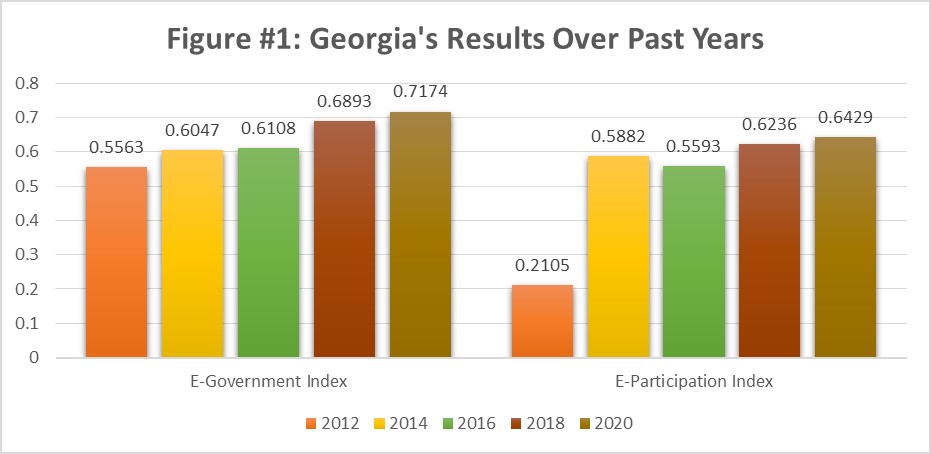
In terms of e-participation, Georgia improved its performance by 0.02 points and its position in the ranking by 7 places. In 2018, Georgia scored 0.62 points and ranked 87th. According to this year's data, the figure has increased to 0.64, and the country's position in the global ranking has risen from 87th to 80th place.
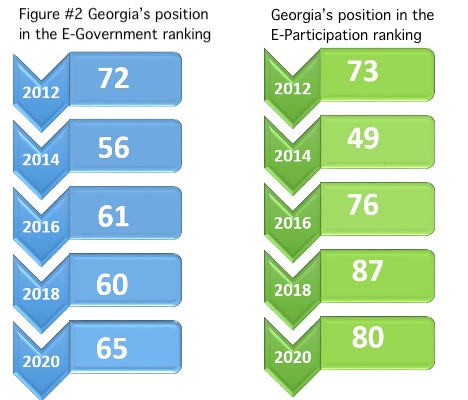
As for the top ten countries in the rankings, the leaders in terms of E-Government are Denmark (97.5 points), Republic of Korea (0.96 points), Estonia (0.95 points), Finland (0.94.5 points), Australia (0.94 points), Sweden (0.94 points), United Kingdom (0.93.5 points), New Zealand (0.93 points), United States (0.93), Netherlands (0.92). It should be noted that Estonia held the 16th place according to the assessment in 2018. The report shows that Estonia is among the countries that made the most significant improvements (approximately 0.1 points) and ended up in the top 3 as a result.
The leading position for E-Participation are held by the following counties: Republic of Korea (1 point), United States (1), Estonia (1), Japan (0.99), New Zealand (0.99), Austria (0.98), Singapore (0.98), United Kingdom (0.98), Australia (0.96), China (0.96), Denmark (0.96), Netherlands (0.96) and Poland (0.96). Estonia’s case should be emphasized again, since it has improved its ranking by 26 positions since the previous assessment. Austria’s results are also noteworthy in this regard, since it has moved up to the 6th position from the 45th.
Georgia’s results fall significantly behind the average scores of other European countries. In terms of E-Government Index Georgia scored 0.82, and for E-Participation - 0.78.
Georgia holds 7th place in terms of e-government and 10th place in terms of e-participation, among 11 neighboring, Eastern Partnership and Baltic countries. For comparison, Georgia held the 6th place in both rankings back in 2018. Below is a detailed analysis of Georgia’s results in relation to these countries.
According to this year's results, in the e-government component, the Baltic countries, Russia, Belarus and Turkey have performed better than Georgia. In terms of e-participation, Georgia's results surpass only Latvia's.
General Overview of the Global E-Government Survey
The e-government survey is conducted every two years by the United Nations, Economic and Social Affairs Department and the Department of Public Institutions and Digital Government (DPIDG). Two Indexes, ranking 193 countries, are published as a result of the Survey: 1) E-Government Development Index and 2) E-Participation Index.
The UN study aims to assess the global trends and challenges in the development of e-government.
E-Government Development Index
As part of the e-Government Development Index, researchers assess countries in three areas:
1. Online Services - Various government websites are evaluated in the country. Particular attention is paid to the existence of national portals, e-services and e-participation platforms. It is noteworthy that Georgia shows a significant decrease in points in this component - -0.11. With 0.59 points, Georgia significantly lags behind the averages of both Europe (0.77) and Asia (0.63).
2. Development of telecommunications infrastructure - this component, includes the following sub-components: number of Internet users, number of mobile phone users, number of wireless broadband Internet users, etc. Although, in relation to the previous assessment, Georgia's score has increased by 0.15 in this component, it is still significantly lower than the European average (Georgia - 0.69 points; Europe - 0.78 points).
3. Human capital - The potential of the population to use new technologies as effectively as possible. Georgia traditionally has the highest rating in this component. At the same time, according to the report, Georgia is among the countries where, despite its high human capital, progress has stalled somewhat due to its relatively weak telecommunications infrastructure.
Georgia had the following scores in all three components of the e-Government Development Index:
E-Participation Index
The e-participation index reflects the government's readiness to facilitate citizen involvement in governance processes with the help of new technologies. In assessing this component, experts consider the following three factors:
1. E-Information: How accessible is Public information online, free of any preconditions;
2. E-Consultation: To what extent do citizens have the ability to engage in the public policy-making process.
3. E- Decision-Making: To what extent is the Government supporting citizens participation in the decision-making process and to what extent are these types of online services developed.
Out of these three components, Georgia's score in the e-consultation and e-decision-making components have decreased. It is noteworthy that during the previous assessment, there was a significant increase from 0% to 45% in e-decision making, which was probably related to the launch of the e-petitions portal, ICHANGE.GOV.GE by the government at the end of 2017, through which, citizens can submit petitions to the government. However, by 2020 the country’s score has shrunk to 18%, possibly due to the low efficiency and scarcity of e-platforms oriented towards the engagement of citizens in the decision-making process.
Neighboring, Eastern Partnership and Baltic countries in relation to Georgia
Among Georgia's neighbors, the Eastern Partnership and the Baltic states (11 in total), the Baltic states, especially Estonia, have the best results, as well as Russia, Belarus and Turkey. In terms of the degree of improvement in the last two years, the largest improvements in the e-government index were shown by Turkey (by 0.4), Lithuania, Armenia and Estonia (all three by about 0.1).
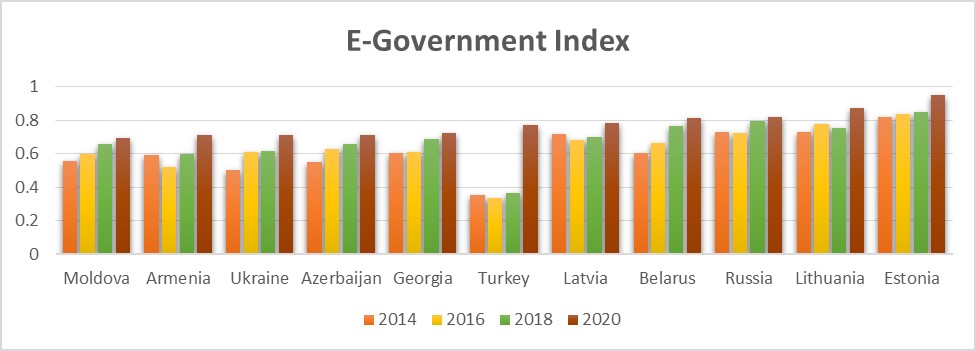
To assess the advantages of these countries over Georgia, it is necessary to study their achievements in each component of e-government. Although Georgia ranks 7th in the e-government index among the 11 countries mentioned, in terms of online services, Georgia (0.59) is higher than only Latvia (0.58). Which means that in terms of introduction and use of online services, Georgia falls significantly behind not only international, but also regional tendencies.
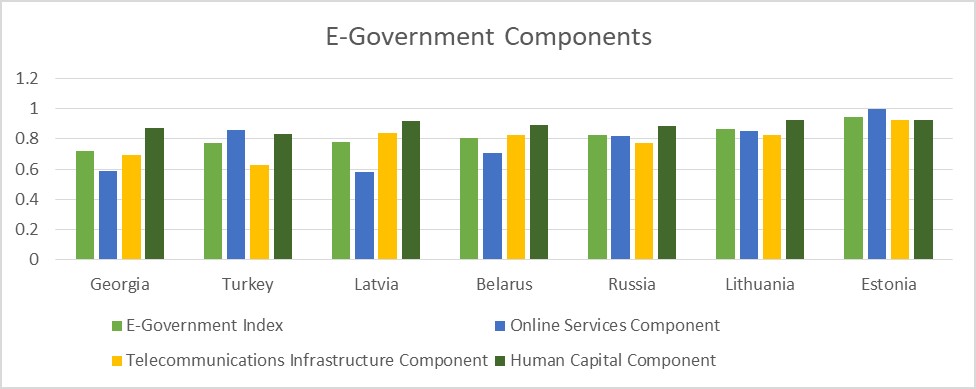
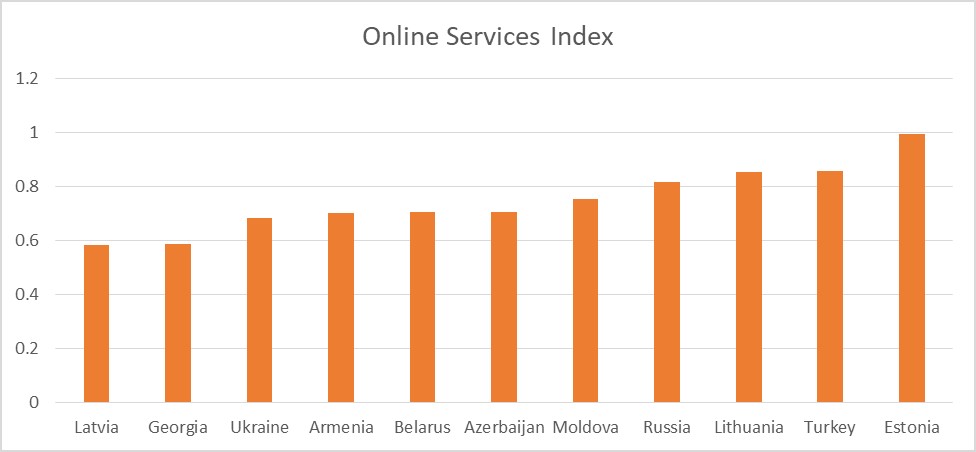
Georgia has a relatively better position in the region in terms of telecommunications infrastructure development. In this component, Georgia ranks sixth out of the 11 countries mentioned. Estonia, Lithuania, Russia, Belarus and Latvia have the best results in this regard.
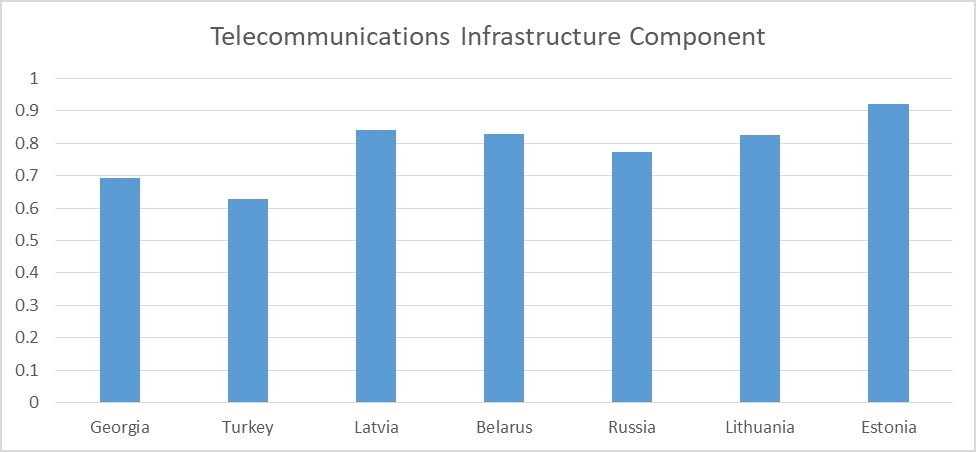
Despite the relatively better indicators in this component, the percentage of Internet users in Georgia is low compared to other countries. According to this component, about 63% of the population in Ukraine and Georgia use the Internet. Among the mentioned countries, Estonia is the leader in this respect with 89%, followed by Latvia (84%) and Russia (81%). The data indicates that Georgia has to take significant steps towards increasing Internet accessibility.
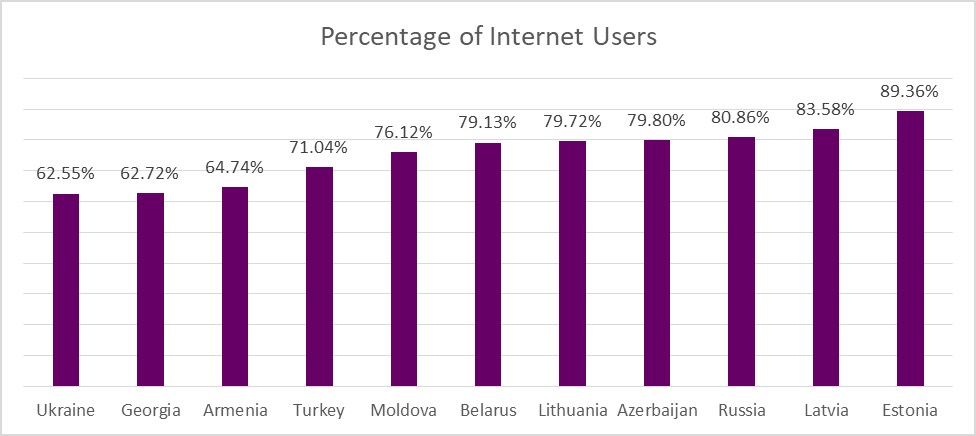
Despite a 7-place improvement in the global ranking in terms of e-participation, Georgia is in the 10th place among 11 countries and only outperforms Latvia with a score of 0.64. It is noteworthy that Turkey (+0.8 points, 23rd place in the global ranking), Armenia (+0.4 points, 57th place in the global ranking) and Ukraine (+0.24 points, 46th in the global ranking) have shown great progress in the region over the past two years. Additionally, Estonia ranks first in terms of e-government, along with the Republic of Korea and the United States, as a result of improved scores and rankings in recent years.
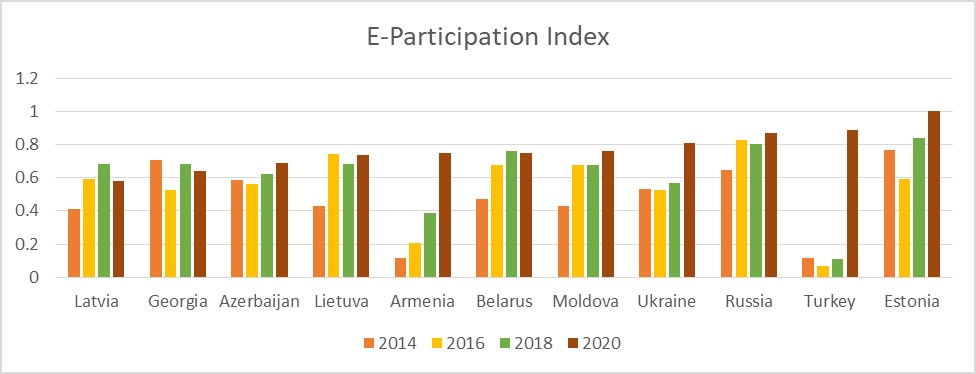
Global Tendencies and Georgia
The UN E-Government Study discusses new trends in digital transformation. In particular, the following are the new approaches that countries are implementing as part of the e-government systems reform:
- Joint use of online and offline communication channels in the provision of services;
- Involvement of state agencies and civil society in the implementation of digital services;
- Expansion of e-participation and partnership;
- Implementation of data-oriented approaches;
- Strengthening digital capabilities;
- Use of new technologies such as artificial intelligence and blockchain, especially in the development of smart city concepts.
In terms of service provision, the report mentions that close to 80% of Member States offer specific services for youth, women, older people, persons with disabilities, migrants and/or those in poverty, and other groups.
The study also examines the reasons for the success of countries in the field of e-government. While there is a positive correlation between the EGDI ranking and the income level of a country, financial resources are not the only critical factor in e-government development. A strong political will, strategic leadership, and the commitment to expanding the provision of digital services have all been named as factors that allow a country to have a higher EGDI ranking.
Digital trade, digital economy and open government data are emphasized in the discussion of regional priority areas. There are several factors leading to success in these areas as well: political will, quality of governance, institutional capacity, access to technology, digital abilities.
Several challenges are outlined in terms of implementing e-government mechanisms. Overcoming these challenges allows countries to achieve significant results. In particular, the study mentions that the failure of e-participation initiatives can often be traced to a lack of clear objectives, failure to analyze stakeholders’ motivation to engage, lack of evaluation and feedback. Additionally, the study emphasizes the critical importance of linking e-participation initiatives with formal institutional processes, in order for people to see that participation has an impact. As for public organizations, the implementation of e-participation activities should lead to a transformation in administrative culture and implementation of modern approaches. Which in turn will support the institutionalization of electronic processes.
Another noteworthy recommendation concerns the implementation of data-driven approaches. The study notes that the growing technological capacities to process ever-larger and more complex data sets can provide policymakers better insight and make e-services more efficient. To ensure all this, it is necessary to have: common open data policies and regulations, a national data strategy, a data ecosystem and data technologies.
In addition, deriving from global trends, nine key pillars have been outlined for digital government transformation:
The report also highlights the growing importance of e-government in the context of the COVID-19 pandemic. The study notes, that digital government technologies are being developed along with the implementation of distancing measures. Furthermore, governments are actively using various e-platforms, portals and other innovations throughout the crisis.
Given these factors, unfortunately, Georgia does not have an updated e-government strategy based on an in-depth analysis of the achievements and challenges of the 2014-2018 strategy. At this stage, specific issues related to e-government and e-services are included in the public administration reform strategy and action plan. However, in order to keep pace with international trends and accelerate reforms in this area, it is necessary to recognize e-government as one of the priority areas for the country, based on which, a unified approach for the country, a strategic vision and several-year plans for the development of e-government will be established.
In addition, the country’s biggest challenge is in relation to the regions, as e-government is not equally developed at the central and local government levels. The so-called "Digital divide" between the central and local governments has a negative impact on the country's e-government rating. As of today, modern digital technologies, electronic management systems and facilities are used in only a few municipalities.
As international practice shows, access to data plays a crucial role in the development of e-government in the country. In this regard, first of all, it is necessary to establish a uniform standard for mandatory disclosure of public open data and to develop concrete government policy. Although Georgia has created an open data portal DATA.GOV.GE, only a small amount of data is available on it to this day. Furthermore, the commitment undertaken through the Open Government Partnership (OGP) Action Plan, to initiate a new Freedom of Information Law remains unfulfilled. Its adoption would establish modern standards of access to public information and open data processing in the country.
Conclusion
The 2020 UN Survey summarized the research results from the past two years of e-government development. It is true that Georgia's scores in both indexes have improved slightly, but the country's position in the global ranking has not increased significantly. On the contrary, regression was observed in the case of the e-government index. With this in mind, it is necessary for the government to establish a more ambitious agenda and take into account the latest international trends and innovative approaches to e-government. Based on Georgia’s results, it is necessary to develop an e-government strategy for the upcoming years, which will define a common approach, vision, and activities in terms of the issues at hand. Furthermore, it is necessary to ensure effective coordination of the implementation of reforms in this field. In addition, it is important to provide more accessibility to online services, promote the use of these services, increase Internet access, eliminate the digital divide, accelerate the implementation of e-government systems in the regions of Georgia, and introduce and improve uniform standards of access to open data.
/public/upload/GG/E-Governance_E-Participation-ENG-final.pdf

This material has been financed by the Swedish International Development Cooperation Agency, Sida. Responsibility for the content rests entirely with the creator. Sida does not necessarily share the expressed views and interpretations.